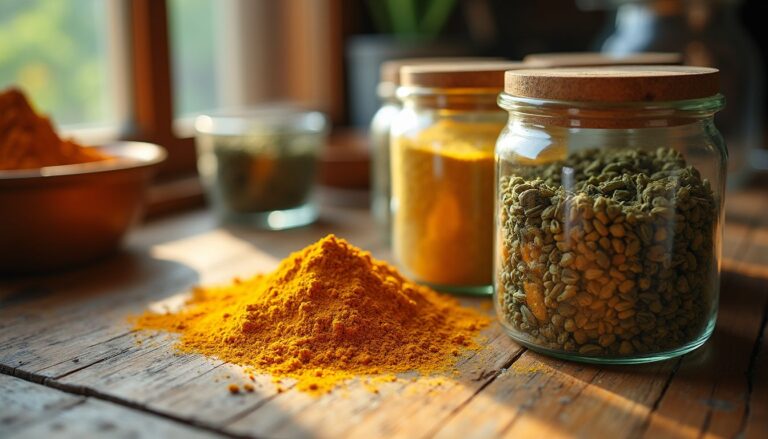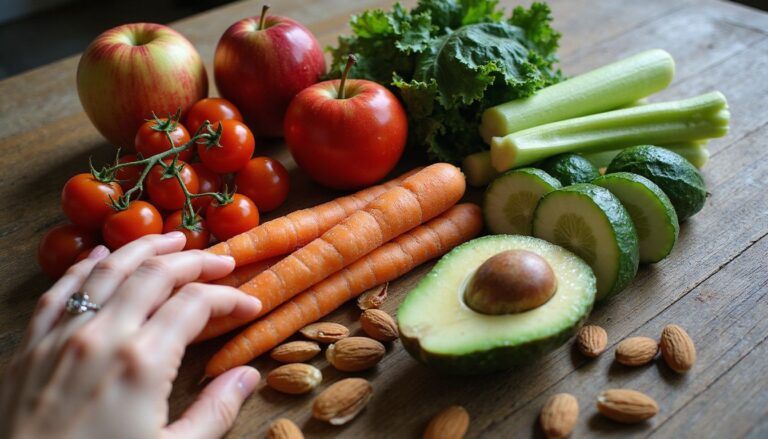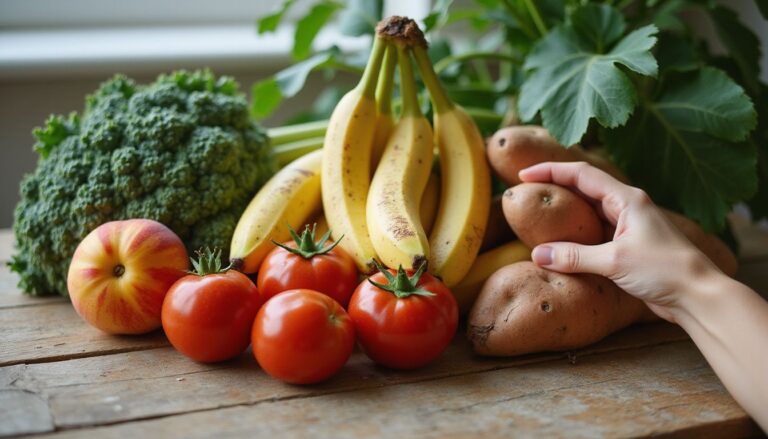Foods For Healthy Hair: Boost Hair Growth With The Best Foods
Our Nutrition Assistant AI Suite will transform your body. You will lose fat, get toned, and build muscle. Gain confidence and optimal health.
If your hair feels dry, brittle, or thin, your plate can help. Healthy hair depends on what you eat because your scalp and strands need steady nutrients. Key players include protein, iron, biotin, vitamin A, vitamin C, vitamin E, zinc, selenium, and healthy fats. These nutrients fuel growth, protect follicles, and keep your scalp comfortable.
This guide highlights the best foods for healthy hair, plus what to limit. Small, daily choices can support stronger strands and a calmer scalp. If you want fuller-looking hair, start in the kitchen.
Key Takeaways
- A balanced diet with protein, iron, biotin, vitamin E, and omega-3 fats supports steady hair growth.
- One medium sweet potato provides roughly 160% of your daily vitamin A target and helps moisturize the scalp.
- One ounce of almonds delivers about 48% of daily vitamin E, which helps shield follicles from damage.
- Spinach supplies iron and up to 20% of daily vitamin A per cup to support oxygen flow and scalp health.
- Highly processed foods and excess alcohol can reduce nutrient absorption and may increase shedding through inflammation.
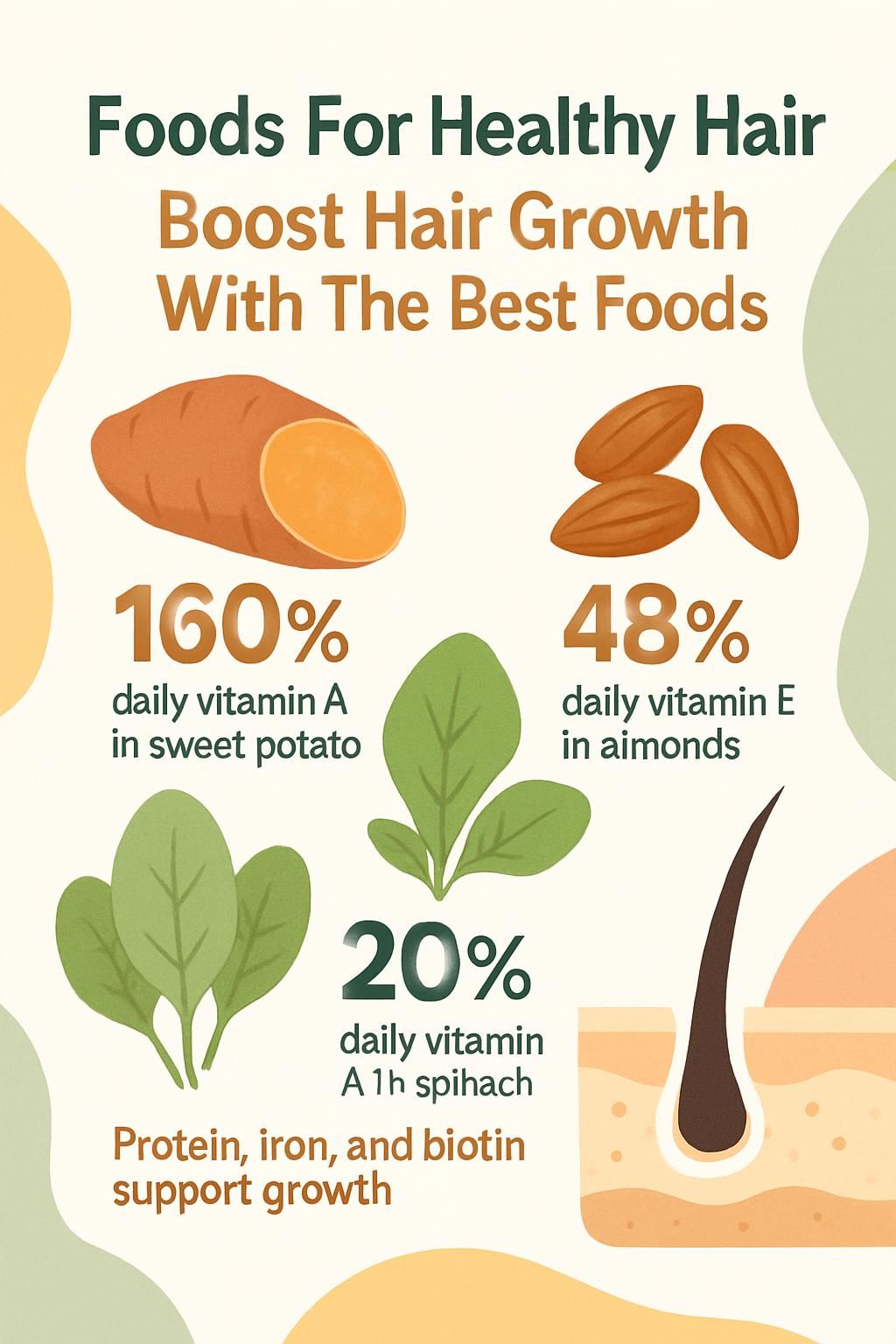
Why is nutrition essential for healthy hair?
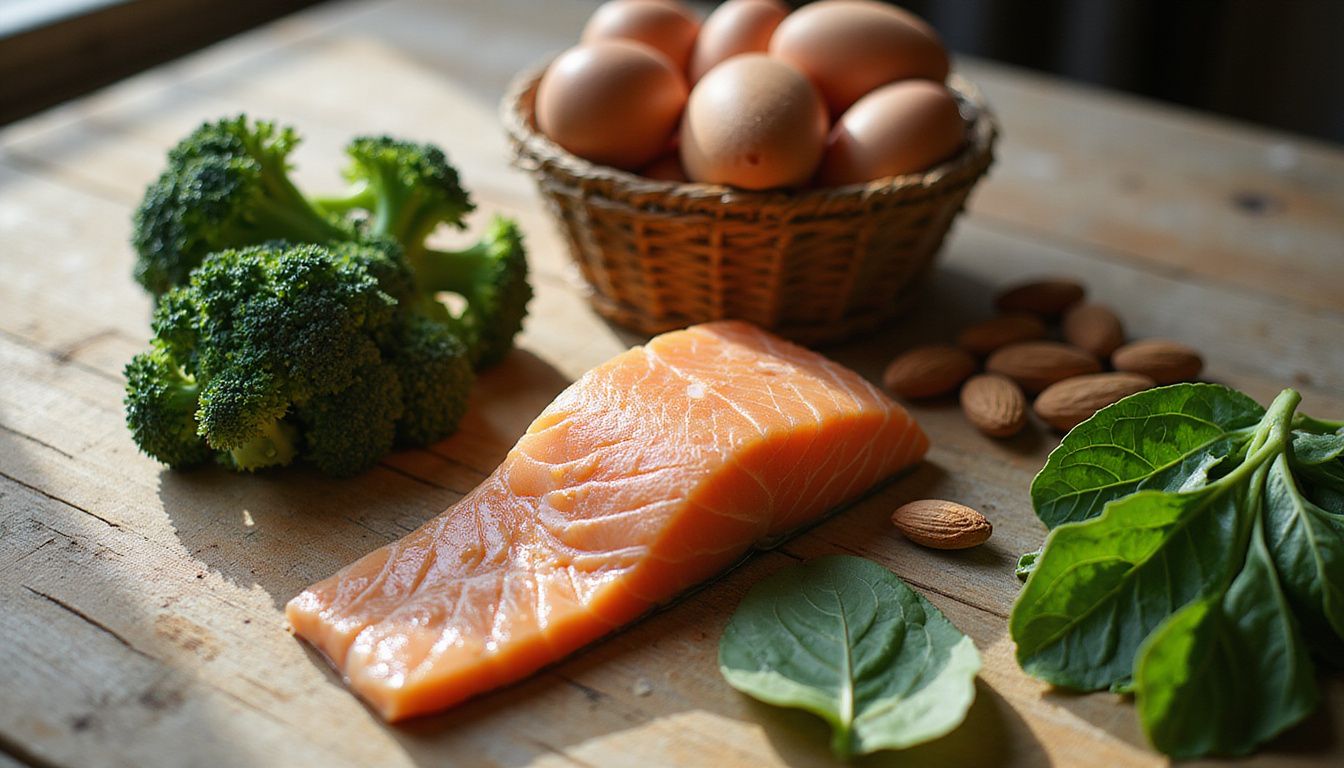
Your hair is made of keratin, a strong protein. You need enough protein and calories each day to build it. Too few nutrients can lead to brittle strands, a dry scalp, and slower growth.
Deficiencies show up fast. Low iron can limit oxygen to the scalp. Low B vitamins may slow new cell production around each follicle. Very low calorie or low carbohydrate diets often change hair texture and shine.
Many people notice more strands in the shower after strict dieting. Shifting to balanced meals with vitamins and minerals often restores softness and sheen within weeks.
Hair grows quickly compared with many tissues. It needs reliable fuel every day to thrive.
Key nutrients that promote hair growth
Several vitamins and minerals support your scalp, nails, and hair. Focus on variety from whole foods to cover these building blocks.
How do protein and keratin support hair growth?
Keratin forms the structure of each hair. You build keratin from protein in your diet. Too little protein can lead to weak or thinning strands.
Helpful choices include:
- Eggs for complete protein plus biotin, a helper for keratin production.
- Lean beef or poultry, where a 3.5 ounce serving of cooked sirloin provides about 29 grams of protein.
- Beans for plant protein and minerals, such as black beans that provide meaningful zinc.
Consistent protein helps maintain dense, healthy hair without relying only on supplements.
Why is iron important for hair oxygenation?
Iron allows red blood cells to carry oxygen to your scalp. Low iron can slow growth and may increase shedding.
Choose heme iron from red meat for easier absorption. Pair plant sources such as spinach and beans with vitamin C rich foods to improve uptake. This mix supports shine and helps lower the risk of iron deficiency anemia, which can affect hair density.
What benefits do omega-3 fatty acids provide for hair?
Omega-3 fatty acids support your scalp’s natural oils, called sebum. Sebum helps prevent dryness and breakage.
Studies in women found that omega-3 and omega-6 supplements with antioxidants reduced hair loss and increased hair density over several months. Fatty fish like salmon, herring, and mackerel are rich sources. Plant options include chia seeds and ground flaxseeds, where two tablespoons offer about 4.7 grams of omega-3s. Regular intake supports shine and comfort, especially if your scalp feels tight or dry.
How do biotin and B vitamins improve hair health?
Biotin helps your body produce keratin. Severe biotin deficiency can trigger thinning hair and brittle nails, although true deficiency is uncommon with a balanced diet.
Eggs and beans provide biotin along with B vitamins such as folate and B12. B vitamins also support healthy blood flow to follicles. If your intake is low, new growth may slow and dryness may increase. Food first is your best approach unless your clinician advises testing or targeted supplements.
Why is vitamin A crucial for scalp health?
Vitamin A helps sebaceous glands produce sebum that keeps the scalp moisturized. Too little can cause dryness. Too much from high dose supplements can also trigger shedding, so balance matters.
Smart sources include sweet potatoes, winter squash, and spinach. One cup of cooked spinach gives up to 20% of daily vitamin A. A medium sweet potato can cover about 160%. Focusing on colorful produce supplies steady vitamin A without the risks tied to megadoses.
How does vitamin C aid collagen production for hair?
Vitamin C helps your body make collagen, a structural protein that supports hair strength. It also improves iron absorption from plant foods.
Good picks include strawberries and sweet peppers. A cup of strawberries provides about 85 milligrams of vitamin C, more than your daily need. One yellow sweet pepper can far exceed the daily value. Antioxidants in these fruits and vegetables also protect follicles from oxidative stress, which can weaken strands.
What role does vitamin E play in strengthening hair follicles?
Vitamin E is an antioxidant that helps protect follicles from oxidative stress, a process that can lead to thinning. Low levels may raise breakage risk.
Almonds, sunflower seeds, and avocados are rich choices. One ounce of almonds provides about 48% of your daily value. A medium avocado offers about 28%. Some research found increased hair growth with vitamin E supplements over eight months, though food sources remain a safe, long-term strategy.
How does zinc contribute to hair repair?
Zinc supports cell division and repair inside hair follicles. Low zinc can cause telogen effluvium, a reversible type of shedding where too many hairs enter the resting phase.
Oysters are among the best sources. One medium oyster can provide up to 96% of daily zinc for women and about 75% for men. Beans also contribute meaningful amounts. Avoid high dose zinc supplements unless your clinician confirms a deficiency since excess can cause problems.
Why is selenium important for scalp maintenance?
Selenium supports antioxidant defenses in skin cells on your scalp. It helps protect follicles from free radicals and supports normal metabolism.
Brazil nuts, sunflower seeds, and whole grains supply selenium along with helpful minerals like zinc and iron. Food sources are safer than high dose pills because too much selenium can cause side effects. A balanced intake helps your scalp feel calm, less dry, and better able to recover from stress.
Top foods to eat for healthy hair
Power your plate with nutrient dense picks. These foods supply the building blocks your hair needs each day.
How does salmon and fatty fish boost hair health?
Salmon, herring, and mackerel supply protein, vitamin D, vitamin E, and omega-3 fats. In a study of 120 women, omega-3 and omega-6 supplements with antioxidants helped reduce hair loss and improved hair thickness.
Try fatty fish at least twice a week. Canned salmon or tuna can be quick options. Consistent intake supports follicle strength and may help your nails too, since similar proteins and minerals build both.
Why are eggs good sources of biotin and protein?
Each large egg provides about 6 grams of high quality protein. Protein supports follicle activity and helps prevent dryness and breakage.
The yolk contains biotin, which your body uses to make keratin. Eggs also provide vitamin D, zinc, and selenium that support healthy skin and hair. If you prefer simple meals, eggs are an easy, affordable way to add these nutrients.
How do spinach and leafy greens support hair growth?
Leafy greens such as spinach deliver vitamin A, vitamin C, iron, and folate. A cup of raw spinach can provide up to 20% of daily vitamin A, which supports sebum production for a comfortable scalp.
Iron in greens helps red blood cells carry oxygen to follicles. Cooked greens like kale or collards add similar benefits. Pair them with vitamin C foods for better iron absorption. Many people enjoy adding sweet potatoes to round out beta carotene for extra scalp support.
What makes sweet potatoes beneficial with beta-carotene?
Sweet potatoes are packed with beta carotene, which your body converts to vitamin A. One medium sweet potato, about 114 grams, can meet about 160% of daily vitamin A needs.
Vitamin A supports sebum production and protects the scalp from dryness. Winter squash and other yellow vegetables offer similar benefits. Rotate them in meals to keep vitamin A steady without relying on supplements.
Why are berries and antioxidant-rich fruits good for hair?
Berries like strawberries, blueberries, and raspberries are rich in antioxidants and vitamin C. A cup of strawberries has about 85 milligrams of vitamin C, or 113% of the daily value.
Vitamin C supports collagen, which helps hair resist brittleness. It also improves the absorption of iron from plant foods. Regular servings of bright fruits can help protect follicles from oxidative stress and support stronger strands.
How do avocados provide healthy fats for hair?
Avocados supply monounsaturated fats that help lock moisture into hair. A medium avocado offers about 28% of daily vitamin E, an antioxidant that supports scalp cells.
Adding avocado to salads, smoothies, or toast can reduce dryness and frizz over time. Many people notice smoother ends and easier styling after a few weeks of steady intake.
What hair benefits come from nuts and seeds like almonds, walnuts, and chia?
Nuts and seeds deliver vitamin E, B vitamins, zinc, selenium, and plant omega-3s. These nutrients protect scalp cells, support repair, and help control inflammation that can irritate follicles.
- Almonds: about 48% of daily vitamin E per ounce.
- Sunflower seeds: roughly half of daily vitamin E in one serving.
- Flaxseed or chia: two tablespoons of ground flaxseed supply about 4.7 grams of omega-3s.
Rotate a mix of nuts and seeds to fill common nutrient gaps, especially if you follow a plant-based eating pattern.
Why are oysters and shellfish important sources of zinc?
Oysters are a top source of zinc, an important mineral for growth and repair inside follicles. One medium oyster can provide up to 96% of the daily value for women and about 75% for men.
Adequate zinc helps prevent telogen effluvium, a reversible shedding pattern. If you eat shellfish once or twice a week, you can cover zinc needs without high dose supplements.
How do beans and lentils supply plant-based protein for hair?
Beans and lentils offer protein, iron, biotin, folate, and zinc. A 3.5 ounce portion of black beans can provide up to 14% of daily zinc for women and about 10% for men.
Add lentils to soups or toss beans into salads for an easy protein boost. This swap is budget friendly and supports healthy hair, skin, and nails through steady minerals and amino acids.
What are the benefits of Greek yogurt for calcium and protein?
Greek yogurt is rich in protein, which supports keratin structure. One cup often contains about 10 grams of protein, more than many cereals.
It also supplies calcium, which supports cellular processes in follicles. Pair it with berries and seeds for a simple breakfast that covers protein, vitamin C, vitamin E, and healthy fats in one bowl.
Which foods should you avoid for optimal hair health?
Certain foods disrupt nutrient balance and may stress follicles. Cutting back can help your routine work better.
How do sugary foods affect hair health?
High sugar intake can drive inflammation that irritates the scalp. It can also disrupt absorption of iron, biotin, and zinc. Low absorption means slower growth and weaker strands.
Excess sugar is linked with conditions like type 2 diabetes and some thyroid issues, which can affect hair. Many people notice fewer split ends and better scalp comfort after trimming sugary snacks for a month.
What is the impact of alcohol and excessive caffeine on hair?
Alcohol dehydrates your body. That can leave your scalp and hair dry and brittle. Very high caffeine intake may interfere with iron and calcium absorption, which can slow healthy cell activity in follicles.
Both alcohol and caffeine can disrupt sleep. Poor sleep reduces nightly repair, so strands may grow slower. If your scalp feels itchy after heavy drinking or several energy drinks, hydration and nutrient intake likely need attention.
Why should processed and junk foods be limited for hair care?
Highly processed snacks often lack protein, beta carotene, B5, zinc, and selenium. These nutrients are important for healthy hair growth. Empty calories can also crowd out nutrient dense choices like beans, chicken, yogurt, or nuts.
Processed items can raise oxidative stress, which harms scalp cells. Many people see fuller, less brittle hair after replacing packaged snacks with whole foods for several weeks.
How does a healthy diet support scalp health?
A nourished scalp is the foundation for strong growth. Think of it as healthy soil for a garden.
Why is maintaining hydration important for hair growth?
Water moves nutrients throughout your body. It supports scalp comfort and helps prevent brittle strands and flakes. Even mild dehydration can reduce cell activity in the scalp.
Aim to sip water regularly during the day. Hydration also helps deliver vitamins and minerals like biotin and zinc to follicles where they are needed.
What role does blood circulation play in delivering nutrients to hair?
Good circulation delivers oxygen and nutrients to follicles. Iron helps red blood cells carry oxygen, which keeps growth cycles active.
Strong blood flow improves delivery of protein, biotin, and antioxidants to the root. Heart healthy habits, such as walking and balanced meals, support this delivery system. Hydration helps keep everything moving.
What lifestyle habits improve hair health?
Daily habits can support your plan. Small changes, done often, add up over time.
How do regular exercise and stress management benefit hair?
Regular exercise improves circulation, which sends nutrients to follicles. Activities like brisk walking or cycling can help within weeks.
High stress raises cortisol, a hormone linked to increased shedding. Simple practices such as deep breathing, short walks, or brief meditation can lower stress. Many people report less shedding after combining stress control with a nutrient rich diet.
What is a proper hair care routine for healthy hair?
Wash with a gentle shampoo so you do not strip natural oils. Follow with a conditioner matched to your hair type.
Use lukewarm water, then pat dry with a towel instead of rubbing. Limit heavy styling products that can dull shine or cause buildup. Keep heat tools on low settings and use them less often to protect the protein structure in each strand.
Why should you avoid overusing heat and chemicals on hair?
Frequent high heat can remove moisture from hair fibers, which leads to breakage. Chemical coloring, relaxing, or perming can weaken the protein structure and irritate the scalp.
Cutting back on heat and harsh treatments helps preserve strength. With less damage, nutrients from foods like salmon, nuts, eggs, and leafy greens can support growth more effectively.
Do you need supplements for hair growth?
Most people meet their needs with a balanced diet that includes eggs, leafy greens, legumes, whole grains, and fatty fish. A standard multivitamin that provides about 100% of daily values can fill small gaps if recommended by your clinician.
Be cautious with single nutrient pills. Very high biotin can skew lab tests. Too much zinc can lower copper levels. True biotin deficiency is rare unless you have specific medical conditions or severe calorie restriction. Talk with your healthcare professional before starting any supplement, especially if you already eat nutrient dense foods.
Conclusion
Healthy hair starts with what you eat. Focus on protein, iron, biotin, vitamins A, C, and E, zinc, selenium, and healthy fats. Colorful fruits and vegetables supply antioxidants that protect your scalp and follicles. Eggs, salmon, leafy greens, nuts and seeds, beans, and yogurt make a strong base for daily meals.
Drink water through the day to keep your scalp comfortable. Pair smart eating with gentle care, movement, and stress control. This steady routine supports hair growth, clearer skin, and sturdy nails. If you have sudden or severe hair loss, consult a clinician to rule out medical causes.
References: [1] National Institutes of Health, Office of Dietary Supplements, fact sheets for iron, vitamin A, vitamin C, vitamin E, biotin, and zinc. [2] Peer reviewed data on omega-3 and hair density from controlled trials. These sources support the nutrient roles described above.
FAQs
1. Which foods help boost hair growth and keep hair healthy?
Protein-rich foods like eggs, poultry, and fish support strong hair structure. Leafy greens such as spinach provide iron that helps carry oxygen to the scalp. Nuts and seeds supply vitamin E and omega-3 fatty acids for scalp health. Research from the Journal of Cosmetic Dermatology shows diets high in these nutrients can improve hair density.
2. How do vitamins affect hair growth?
Vitamins A, C, D, and biotin play key roles in cell turnover and collagen production which are vital for growing new strands. For example, a study published in Dermatology Practical & Conceptual found that people with low levels of vitamin D often experience slower follicle activity.
3. Can eating certain foods prevent hair loss?
Consuming zinc-rich foods like oysters or pumpkin seeds may reduce shedding since zinc supports tissue repair around follicles. Iron from beans or lean meats also prevents anemia-related thinning according to data from the American Academy of Dermatology.
4. What is a simple meal plan for healthier hair based on evidence?
A breakfast with scrambled eggs and spinach provides protein plus iron; lunch featuring grilled salmon offers omega-3s; snacks including walnuts add vitamin E; dinner with chicken breast paired with quinoa delivers more protein along with essential minerals.
Personal application: After adding more leafy greens, nuts, and oily fish to my meals over three months I noticed less breakage during brushing.
Summary: Eating balanced meals rich in proteins, vitamins A-D, biotin, iron, zinc plus healthy fats supports stronger strands while helping reduce excess loss according to current research findings.


